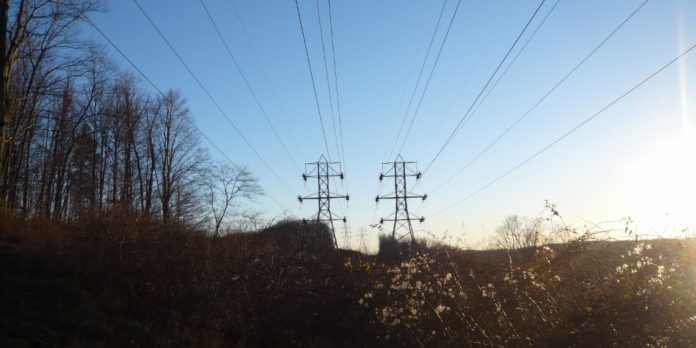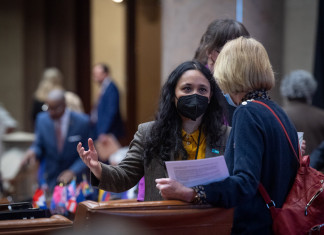
With additional reporting by Margaret Wentworth
A proposal to run new 345-kilovolt power lines through the Hudson Valley has angered residents and stirred local communities into action.
Three of the four proposals currently being considered by the state’s Public Service Commission impact the eastern side of the Hudson River. Maps of the projects show transmission lines planned for a north-to-south run through the middle of Milan and Clinton and continuing through much of Pleasant Valley before ending at the substation there. One proposal would also have lines running along the Pleasant Valley-Hyde Park town line.
The $1 billion project was the brainchild of the New York Energy Highway Taskforce, created by Gov. Andrew Cuomo in 2012 to address the need for upgrading and modernizing the state’s energy infrastructure.
A year ago, the PSC, which regulates utilities, put out a call for 1,000-megawatt transmission systems to solve electrical transmission congestion, with preference to be given to projects that add lines to existing right-of-ways or upgrade existing lines. According to PSC documents, the proposals are supposed to use one of two routes: from Marcy Substation in Oneida County, down the corridor east of the Hudson to Pleasant Valley, or from Marcy Substation down the west side of the Hudson, ending in Orange or Rockland County.
Concerned about the possibilities, as well as the unknowns, the town board of Milan convened two informational sessions Oct. 22 and 24 to hear presentations from two of the applicants, National Grid/Central Hudson and NextEra Energy. Both meetings were packed wall-to-wall with residents and local officials.
National Grid and Central Hudson, part of a new consortium of transmission owners called “New York Transco,” is proposing a 153-mile high-voltage power line from Marcy Substation to Pleasant Valley, passing through eight counties and more than 30 towns.
NextEra, an energy company with diverse holdings in 26 states and Canada, has a plan that follows a similar route through Milan but diverges as it goes through Clinton. [The path proposed by a third applicant, North American Transmission, appears to be almost identical to the NextEra one, also going through both towns.]
The biggest problem for local residents is that the plans may require expanding the existing right-of-way, which will mean taking land to widen the corridor in which power lines already exist.
Residents at the Milan meetings were appalled to learn that project engineers believe they may need an additional 100-150 feet depending on which side of the corridor they decide to use. The process for how the developers would approach land owners for acquiring their land is still unclear.
The Hudson Valley is considered by the state’s energy taskforce to be one of several problematic “bottlenecks” for energy transmission, which makes the area a target for new lines.
But there may be no benefit for the towns involved.
At the Oct. 22 Milan meeting, Councilwoman Marion Mathison said that a PSC attorney told her frankly: the benefits of the project “are for the greater good in the northeast…but there are no specific benefits to Milan.”
“This needs to be fixed,” Mathison said. “We want a benefit.”
After both meetings, residents and officials appeared frustrated by the lack of clarity on the process and the proposals. NextEra and Transco representatives confirmed that they do not have final answers on what the impact on properties near the right-of-way will be or what the timetable for choosing a route will be.
The residents in Milan are ready to protest, but they say they need more information.
Over in Clinton, however, the opposition is crystal clear.
At a standing-room only town board meeting Nov. 12, board members and residents voiced unanimous objection to all the proposals.
From lifelong town residents to recent transplants from New York City, the speakers highlighted concerns about possible declines in property values, environmental decimation, loss of historical assets, and destruction of homes and health that could accompany the installation of new transmission lines.
In the end, the board appointed Councilman Michael Appolonia to head an ad hoc committee to assist in coordinating citizen interest groups and hand out information on how the proposals would impact the community. The board will also send a letter to Clinton residents outlining each power line proposal, with maps of the proposed corridors and a list of resources, such as websites.
Finally, the board took official steps to apply for “formal party status” in order to speak at PSC meetings and request intervenor’s funding, which is money the PSC grants to municipalities so that they can conduct their own research and legal actions related to power proposals.
The Clinton town board has already passed a formal resolution notifying the PSC of its objection to the proposals.
Town supervisor Jeff Burns said the power companies and private developers who have crafted the proposals have told him no one will receive lower rates as a result of the project.
“There is zero benefit to us,” Burns said.
But, he recalled, when the Iroquois gas line, which runs through Milan and Clinton, was put in 30 years ago, local communities pushed for, and eventually received, some benefits, including land for town parks.
Burns said he hopes local communities will get some benefit this time also, even if they can’t stop the project itself.
“We have been that conduit for…utilities—gas lines, power lines, even highways—from downstate to upstate. It’s just what we are, we are a conduit for those public services. It’s unfortunate, but we are what we are,” he said.
Milan is also pursuing intervenor funding and formal party status in front of the PSC, and town officials continue to disseminate what information they can get.
The next informational meeting for Milan residents will be Nov. 23 at 10:30am at Town Hall. And Milan officials announced at a special meeting Nov. 7 that they were meeting with the non-profit environmental group Scenic Hudson to discuss ways to present a united protest.
Meanwhile, Dutchess County Legislator Joel Tyner, who represents Rhinebeck and Clinton, has urged the public to voice their opinions about the proposals. He has been holding regular public forums on the topic at Clinton Town Hall since October; the next one is scheduled for Nov. 25 at 5pm.
In a recent email Tyner said he and a citizens group, “No Monster Power Lines,” are pushing for the state to consider underground power lines as an alternative.
State Senator Terry Gipson (D-Dutchess/Putnam) and State Assemblywoman Didi Barrett (D-Mid-Hudson) have both weighed in with warning letters to the PSC about the negative impacts of the project, also asking that all alternatives be considered, including underground lines.
The PSC is taking public comment on the proposals until Dec. 20, according to their website. Information on the different proposals can be found on the Milan and Clinton town websites.







Facebook Comments